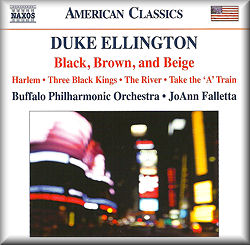1. Harlem (arr. Maurice Peress)
2. Black, Brown and Beige: Black (arr. Maurice Peress)
3. Black, Brown and Beige: Brown (arr. Maurice Peress)
4. Black, Brown and Beige: Beige (arr. Maurice Peress)
5. Three Black Kings: No. 1. King of the Magi (completed by Mercer Ellington)
6. Three Black Kings: No. 2. King Solomon (completed by Mercer Ellington)
7. Three Black Kings: No. 3. Martin Luther King (completed by Mercer
Ellington)
8. The River Suite: I. The Spring (arr. Ron Collier)
9. The River Suite: II. The Meander (arr. Ron Collier)
10. The River Suite: III. The Giggling Rapids (arr. Ron Collier)
11. The River Suite: IV. The Lake (arr. Ron Collier)
12. The River Suite: V. The River (arr. Ron Collier)
13. Take the 'A' Train
Sal Andolina - Clarinet, alto sax (tracks 5-7, 13)
Tony Di Lorenzo - Trumpet (track 13)
Amy Licata - Violin (track 13)
Buffalo Philharmonic Orchestra
JoAnn Falletta - Conductor
It is good to see works by Duke Ellington treated as serious music and appearing on the Naxos label, which mainly issues classical music. However, 'serious' musicians don't always have a deep understanding of jazz, or a feeling for its style. JoAnn Falletta, the conductor of these performances, is quoted on the Naxos website as saying that Duke Ellington 'single-handedly elevated jazz to a level of artistry comparable with all the other art forms'. Much as I admire Ellington, he was by no means the only musician to raise jazz to the level of an art. What about Louis Armstrong, Bix Beiderbecke, John Lewis, Charles Mingus and countless others? JoAnn Falletta's remark suggests the sort of de haut en bas attitude which too many 'serious' musicians still have towards jazz.
Another problem is that orchestras which are used to playing classical music are not always capable of swinging with a jazz beat. Harlem starts with a disappointment - there is no braying trumpet at the beginning, as there was on Ellington's original version. And I miss the rich baritone saxophone sound that Harry Carney interpolated at about four-and-a-half minutes into the piece. Nevertheless the Buffalo Philharmonic makes a good attempt at getting the right jazz feeling, although the recording obscures some of the subtleties of the original. The percussion solo towards the end is usefully extended by the Buffalo orchestra to build towards the climax.
Black, Brown and Beige also has some poor sections compared to Ellington's original - such as the excessively heavy drum beats near the start. But again this is a respectable interpretation of Duke's sound picture of African-Americans experience of coming to the USA as slaves and surviving with dignity through their own culture. There is a tender reading of the 'Come Sunday' theme and some gently swinging jazz in 'Beige'.
Three Black Kings is a ballet suite written by Duke towards the end of his life and completed by his son, Mercer Ellington. It suggests that Duke had a sympathetic feeling for the rhythms and contrasts needed in a ballet. Martin Luther King is a caring waltz with a Jimmy Hamilton-type clarinet solo. It underlines Ellington's concern for civil rights. The River was another ballet suite. It was commissioned by the American Ballet Theater, choreographed by Alvin Alley and premiered in June 1970, four years before Ellington died. Its five movements portray a river in different moods and at different times of the year.
The album closes with Take the 'A' Train, Billy Strayhorn's composition which Duke used as his signature tune. The Buffalo Philharmonic plays it somewhat ponderously but it is lightened by solos from Sal Andolina's sax and Amy Licata's violin. It is interesting to hear a 'classical' orchestra tackling pieces of jazz but the results are mainly what you might expect in such a situation: 'serious' musicians doing their best but not quite reaching the looseness and invention of their jazz counterparts.
Tony Augarde
www.augardebooks.co.uk
